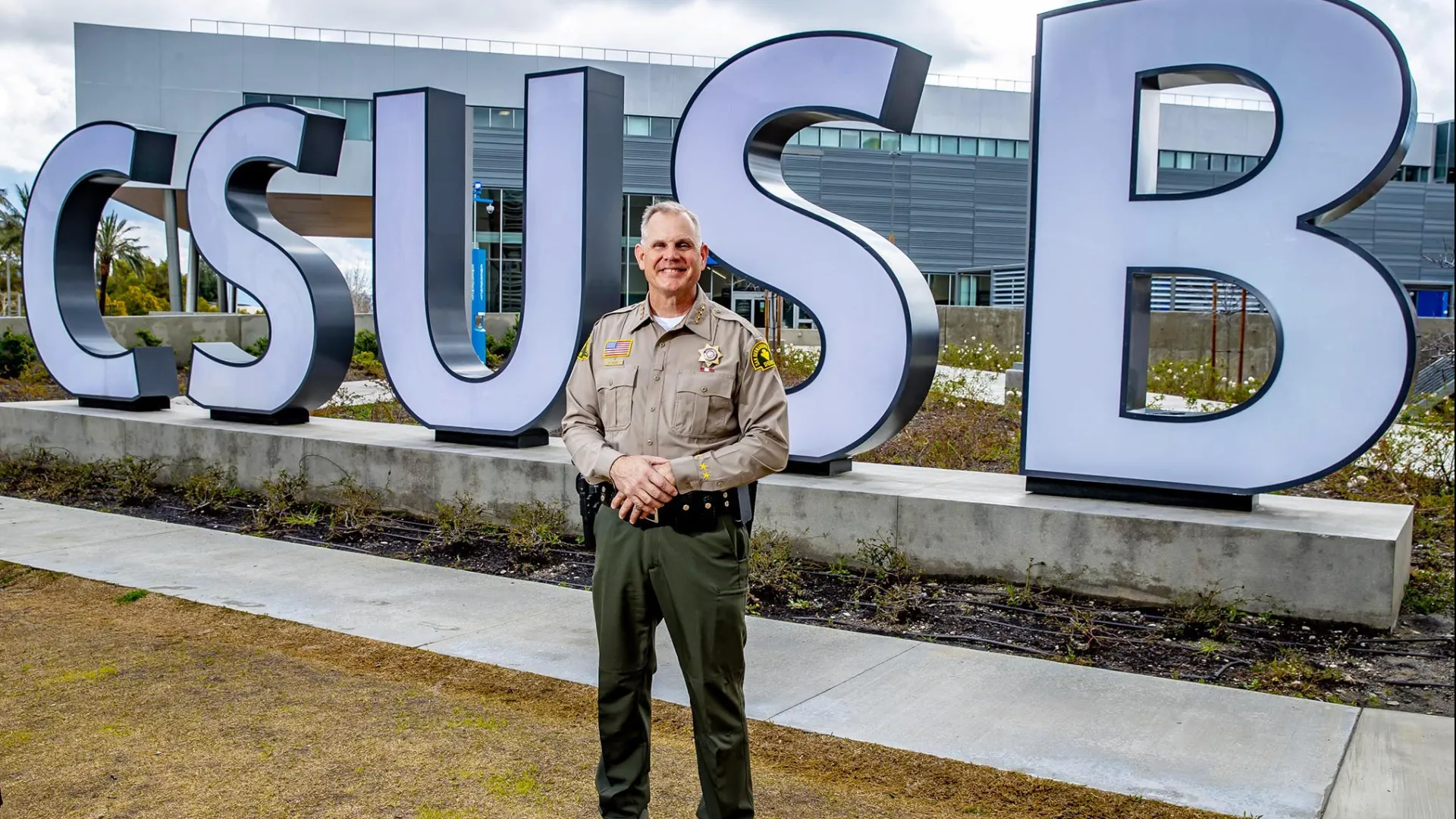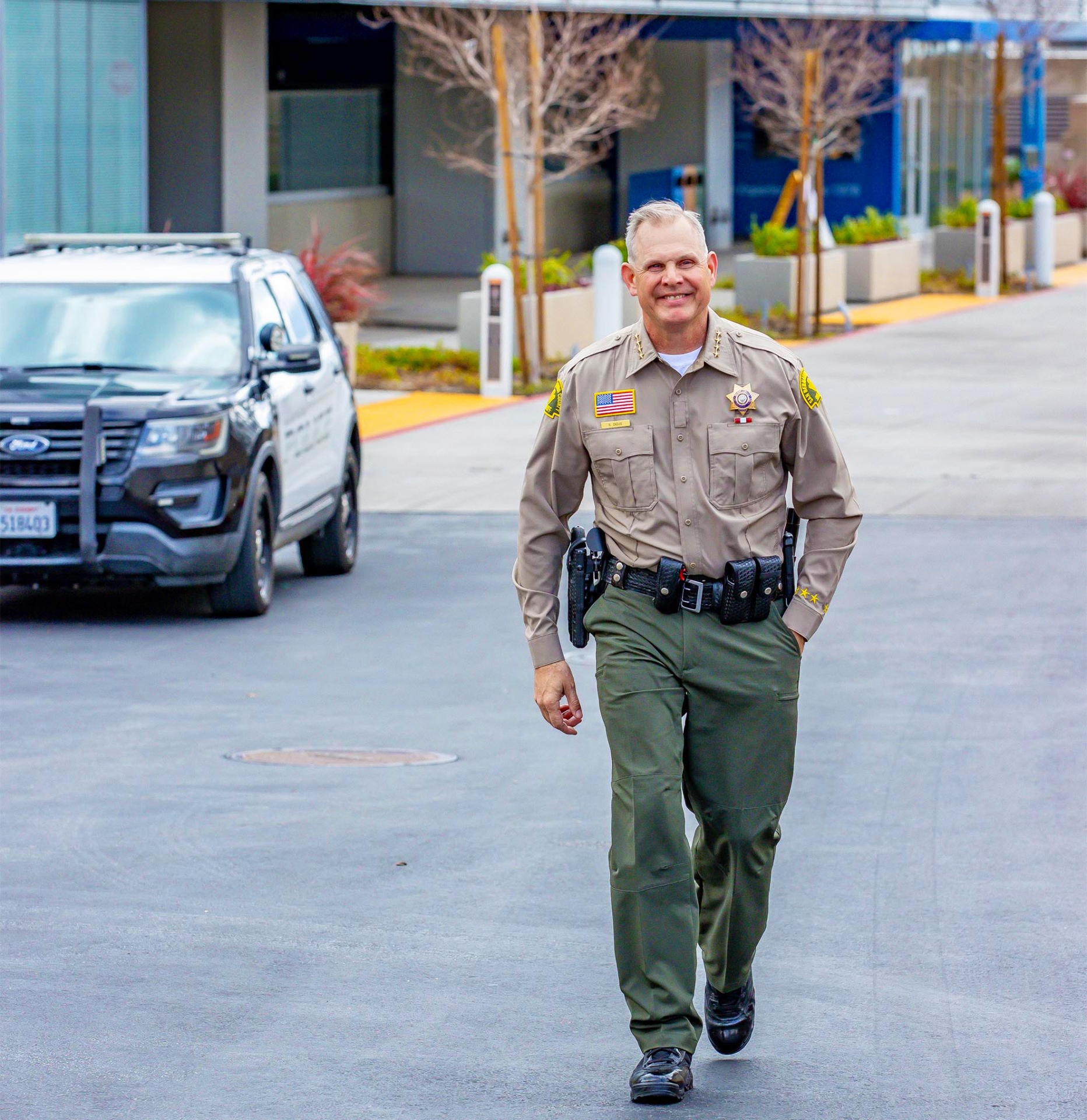Joe Gutierrez | Office of Strategic Communication | (909) 537-3007 | joeg@csusb.edu

Mention being a Cal State San Bernardino alumnus and Shannon D. Dicus (’93 BA criminal justice) beams, his easygoing smile broadens.
“It makes me proud that we can get educated here locally in the Inland Empire and go out and pursue careers, high-paying careers here in the Inland Empire,” he said.
Dicus is sheriff of the San Bernardino County Sheriff’s Department, which serves the largest geographical county in the United States, a region with more than 2.1 million residents. He leads a department with about 3,600 employees with eight county and 14 contract patrol stations.
Dicus, who has been in law enforcement nearly 40 years, joined the sheriff’s department in 1991. He was appointed sheriff in July 2021 and elected sheriff in June 2022. Prior to his appointment, he served as undersheriff, responsible for managing the daily operations of the department.
During that time, one of his significant accomplishments was completing the “Jail Utilization Study.” The project was conducted in partnership with CalForward to determine the effects of prison realignment and recidivism in the jail system.
Before joining the sheriff’s department, Dicus served as a military policeman in the U.S. Army’s 101st Airborne Division and as a federal law enforcement officer with the U.S. Department of Veterans Affairs. At the sheriff’s department, he held positions at every rank, working his way up from serving at the county’s two detention centers to a patrol deputy in Apple Valley, Barstow, Victorville and Victor Valley; to specialized assignments in narcotics, SWAT and the criminal intelligence divisions; and as an assistant sheriff, where he was responsible for three bureau deputy chiefs who oversaw the Corrections, Field Support Services, and Personnel/Training Bureaus.
As he advanced at the department, his college education and degree were crucial.

“When you become a sheriff’s deputy and you go through the academy, they really teach you everything you need to know to be a street cop,” Dicus said. “But as you progress through your career, you start to get into the business side of law enforcement. And the San Bernardino County Sheriff’s Department is an $800 million dollar business and you need to understand how to run it, how to be able to, for instance, if you get a new contract city, how do you staff that?
“Those are all things I learned here at Cal State San Bernardino from my professors, and a number of them were law enforcement professionals that had that experience,” Dicus said. “So, you have that not just educational aspect of it, but you also were talking to experienced professors who could really relate to you with some of the things that they were dealing with and some of the social problems at that time.”
As a child growing up in Joshua Tree, Dicus said there was no question he would be going to college. His grandparents, who grew up in the Great Depression, knew that an education would make a difference, so their three children, including his father, earned bachelor’s degrees.
“Growing up in my family, it was just viewed that getting any type of higher education was really allowing you independence and being able to achieve better employment in the future and things of that nature,” he said.
A college education would also give a better, more well-rounded understanding of life, he added. “It’s been of a tremendous value to me.”
CSUSB was his choice for higher education after the army for a number of reasons, including that the CSU system gave military veterans credit toward their bachelor’s degree, which Dicus said put him ahead of the power curve; he lived in Hesperia at the time so he could commute back and forth; and the university’s small school environment seemed to fit what he was looking for.
He said what he truly enjoyed the most at CSUSB was the social interaction. Two days after graduating from high school, he was in the army, so after completing his tour of duty and coming to the university he saw a lot of social activities and a number of other things going on at campus.
“Here is a very small school environment. I mean, the biggest building on campus was the library, and there were a lot of other trailers and things as the campus was growing during that period of time, so you got to know all your fellow classmates,” Dicus said.
He also valued the faculty and the time they spent with students.
“A lot of the professors were professionals in the industry that you were studying already. So, you really got a leg up in terms of getting a good perspective on what you were trying to achieve your degree for,” Dicus said. “And I think that’s what I enjoyed the most, plus the one-on-one interaction with your professors; they really invested in you, and that was something I genuinely appreciated.”

He said one of the things he credits from going to college at CSUSB is becoming an effective communicator, which has helped in his career and especially as an administrator.
“It’s funny, as you get older and you pursue your career, we do staff meetings,” Dicus said. “I can honestly say that anytime you have any of those meetings, they usually say that communication is an issue. And I think when you achieve an education, it doesn't matter what it is after high school, it helps you to be a better communicator.”
“I can tell you in the law enforcement profession, we’re good problem solvers. So sometimes we aren’t always the best listeners because we want to solve the problem immediately,” the sheriff said.
But being a good communicator also means you’re a good listener in listening to the problem, along with being understanding, which is important when policing the community where the people see law enforcement as an integral partner, he said.
Another key element in leadership is empathy, he added.
“You can’t have a bad day. You always go out and you have to care. When you say good morning to someone, you mean it,” Dicus said. “The minute you’ve said, ‘good morning,’ to that same person for the last six months and just so happens their voice inflection is just a little bit different, you have to pick up on it and taking the time to actually ask them what’s going on in their day.
“I think those things matter.”
Dicus reiterated that getting a college education is important.
“I would tell any student, get an education. Life throws curve balls at you. And a lot of times education is something you fall back on,” he said. “I especially tell law enforcement officers that we’re in an environment where you could get hurt, and a number of things could certainly happen during your career. So, when you pick an educational goal, whether it’s a bachelor’s degree or whatever your topic of study is, always think that that may be your fallback, even if you take a different career path.”
Dicus said he would recommend his alma mater to prospective students.
“I’d tell somebody that was looking for (a university) that even though Cal State San Bernardino is a much larger school than when I went, I still believe that the campus has that one-on-one type of perspective where you get that attention and you can specialize in what your educational goals are and then relate them to whatever career you’re trying to aspire to,” Dicus said.
The sheriff beams when talking about attending Cal State San Bernardino.
“I think without Cal State San Bernardino, we really wouldn’t have that local community future,” Dicus said. “You don’t have to go elsewhere to find what really makes you feel whole in terms of a career. It’s here. You just have to get educated and pursue it.”